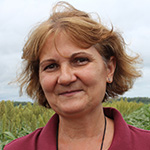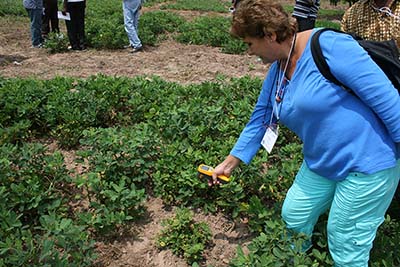High throughput phenotyping
Integration of high throughput phenotyping (HTP) for enhancing breeding programs
 Principal Investigator
Principal Investigator
Maria Balota
Associate Professor, Plant Pathology, Physiology, and Weed Science
Virginia Tech, Tidewater AREC
6321 Holland Road, Suffolk, VA, 23437
mbalota@vt.edu
Co-PIs
Thomas Archibald
Virginia Tech, Blacksburg, VA, USA
tgarch@vt.edu
David Kalule Okello,
NaSARRI, Uganda
kod143@gmail.com
Richard Oteng-Frimpong
CSIR-Savanna Agricultural Research Institute, Tamale, Ghana
kotengfrimpong@gmail.com
Richard Akromah
Kwame Nkrumah University of Science & Technology, Kumasi, Ghana
rakromah@yahoo.com
Daniel Fonceka
ISRA/CERAAS, Thies, Senegal
daniel.fonceka@cirad.fr
Issa Faye
ISRA/CNRA, Bambey, Senegal
Issafaye2001@yahoo.fr
issa.faye2001@isra.sn
Collaborators
Enoch Adiei Osekre
Kwame Nkrumah University of Science and Technology, Kumasi, Ghana
osek652001@yahoo.co.uk
eaosekre.canr@knust.edu.gh
Charles Kodia Kwoseh
Kwame Nkrumah University of Science and Technology, Kumasi, Ghana
ckwoseh@hotmail.com
Area of Inquiry: Varietal Development
Research Countries: Ghana, Senegal, Uganda
Project Length: Four years
Budget: $283,739
 Peanut yield and quality are low in much of Africa. Under the conditions of unavailable basic agricultural inputs, soils depleted of phosphorus and other essential plant nutrients, scarce precipitation, and high disease pressures, peanut production can be improved through the development of new cultivars with more efficient use of water and nutrients, and disease resistance. Breeding efforts can benefit from the development of high throughput phenotyping tools using new, yet inexpensive, technologies and sensors.
Peanut yield and quality are low in much of Africa. Under the conditions of unavailable basic agricultural inputs, soils depleted of phosphorus and other essential plant nutrients, scarce precipitation, and high disease pressures, peanut production can be improved through the development of new cultivars with more efficient use of water and nutrients, and disease resistance. Breeding efforts can benefit from the development of high throughput phenotyping tools using new, yet inexpensive, technologies and sensors.
Objectives include:
1) Develop high-throughput phenotyping (HTP) tools for field selection for disease, drought, and variety performance. These HTP tools can be used in the breeding programs in Senegal, Ghana and Uganda as “centers of excellence for peanut breeding” in West and Eastern Africa;
2) Develop effective HTP systems to determine peanut maturity and oleic fatty acid content. These are necessary steps towards quality control in seed production;
3) Enhance the breeding capabilities in Western and Eastern Africa by procurement of relatively inexpensive sensors and their software needed to retrieve data necessary for objectives 1 and 2. The team will train researchers, technicians and graduate students on how to use the sensors and software;
4) Enhance the youth and gender awareness for the value of innovative plant breeding and variety development for increased regional food security. The team will collaborate with 4-H Youth Clubs in Senegal and Ghana and the Youth Farmers Association of Uganda.
